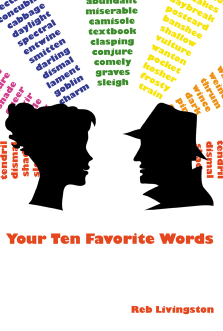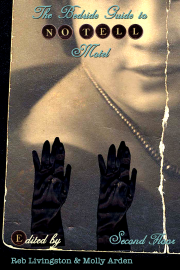My Unsexy Suggestions for Starting a New Online Magazine
Over the past few weeks Didi has been sharing her suggestions/opinions on how online poetry magazines should operate and after reading this kinda hilarious article about someone's failed attempt at sustaining a print magazine (found via Silliman), I thought I'd throw in my 2 cents. It's an unsexy 2 cents -- it's the practical stuff that's not nearly as fun as coming up with the magazine's name, manifesto, purpose, who to invite to contribute, etc. Most of it deals with organization and planning. Organization allows you to get a great deal of work done. Good planning avoids a lot of future tedious, repetitive tasks -- and believe me, there's already enough of that running a magazine. Why add to it?
If you're planning to publish a magazine that will grow in any kind of scale (meaning, if you plan on publishing more than once), these are topics you'd benefit to learn about and consider.
1. Content Management -- the most important technical aspect of putting content online and yet few new poetry magazines seem to take this into consideration. In fact, every time someone asks me for advice, this is the advice they all ignore -- probably because it sounds technical. But . . .
How is the work being archived? How are the archives displayed? Is it easy to link to individual pages? Are URLs going to change when the next issue is published? (very bad!) What happens if you need to make an unexpected, unplanned change on every single page of your magazine sometime in the future -- are you going to have to go back and change hundreds, possibily thousands of pages individually by hand, or simply change a template or two? What if you decide to re-design?
This becomes really important down the road. Web Content Management software makes this easy and automatic. (No Tell Motel uses pMachines -- which is no longer supported, that company's new web content management software is ExpressionEngine). Blogging software does content management too and using it doesn't mean your magazine has to look like a blog, or publish daily, or have dates or comments fields or a blog roll or whatever -- lots of "general" websites use these kinds of softwares for content management. You can publish "issues" just as easily. I use ExpressionEngine for No Tell Books and my general author site -- see, not blogs and incredibly easy to update and add content. You don't need Dreamweaver or any other expensive software if you're not doing any serious web design -- there are numerous templates out there than can be manipulated, changed and made completely unique. A lot of content management software is free or inexpensive, but if you want something really fancy, there are some web content management systems you can pay for -- although you likely don't need to. I don't.
NTM has been publishing since August 2004 and including all content from then until the end of July, that's 1093 pages. Publish on a quarterly schedule and in three years you could easily have that many pages to manage too. Even if you only have half or a quarter that many pages -- do you *really* want to manually manage every single page in your archive?
And if you need technical help setting up an online magazine, putting a content management system in place means you only need help that first time -- and from there you're set to publish and edit future pieces/issues all by yourself. You won't be beholden to your html programmer or designer.
2. Web Hosting -- understand what you need and what you're getting. Now I don't pay for outside web hosting (have my own server in the house), so I don't have a lot experience with this, but I've seen online magazines shut down mid-month because their plan had a visitor quota they went over.
And if you do your own hosting, for Christ's sake have a fast connection. If someone can tell you're doing your own hosting based on how long it takes to load your magazine, maybe you shouldn't be doing your own hosting.
3. Submission Management -- whether you're using the CLMP Submission Manager or your own system. When it comes to this, I'm totally low-tech, I use a spreadsheet. However you do it, you need something that records names, e-mail addresses, titles, dates, responses, etc. Once people start adding your magazine to their blog rolls, link pages, lists, databases and guides, you'll be inundated with unsolicited submissions (if you're taking them). If a trade magazine like Poets & Writers or Writers' Digest write two sentences about your magazine, prepare to be butt slammed (with submissions -- never fear, book sales or paid subscriptions will unlikely be affected).
Submissions always get lost, fail to arrive, some addresses get inadvertently marked as spam, e-mail accounts get nuked and everything is lost. If there's more than one person reading submissions, you need a system that gives everyone access to the submissions and the ability to discuss among each other. For discussion among multiple readers, you could set up a private wiki page or message board and password protect it. If it's just two readers, you can probably do it all via e-mail. It can be an informal, uncomplicated system. In fact, it's best to stick to something simple. Else through the virtual clutter and mismanagement you'll become one of those online magazines known for it's irresponsibility and lack of professionalism -- the kind of magazine that takes a year to respond, or never responds or publishes work without ever notifying the authors. Word of regular screw-ups spreads fast. People (poets especially) take such inconsideration personally. Resentment festers and suddenly hundreds of people have a firmly negative opinion of you -- and that's not including all the people who resent you for rejecting their work.
4. Layout -- so basic, yet so neglected. Is the content top-level and easy to find or did you design a treasure hunt? Is it obivious to the reader what she'll get if she clicks on something? I mean, does she know that by clicking on a hyperlink or an image she'll be taken to a poem, an essay, a video, what? In a world of links, do you really think many people will spend the time to figure out how to navigate your magazine? Is it easy and obvious how to get back to the front page/table of contents? If the piece has a title and an author, is that clear?
Is the text reader-friendly or are you prematurely blinding people with white text on a black background with a 9 point font? How many people instantly curse you upon first gaze of your magazine? Do you have any idea of the kind of karma you're creating for yourself? If there's an online magazine publisher hell, you will be sent there to spend your eternity.
5. Send Galleys -- this is really easy to do, you send the author a link to her page(s) before publication. She responds with "Looks great!" or "X needs to be changed to Z." You'd be surprised how many errors (especially formatting) happen, how often somebody will sign every correspondance as "Chuckie Chuckster" yet expect you to know he publishes as "Chuckles J. Chuckster, III" This also protects you from your own dumb ass mistakes, which you will make. Mistakes you will be forgiven for if you give the author a chance to correct them.
Yes, I agree, it's way more fun to discuss your concept, how your magazine is filling a void in poetry publishing, shaking things up, sticking it to all the asslickers. By all means, do that too -- that's the fun part and likely why you're doing any of this in the first place. Give your ideas a boost with a little thought on implementation -- that way readers won't be distracted by all that other stuff and maybe some will actually get (and appreciate) what it is you're trying to do.
Labels: publishing






6 Comments:
That's kind of you to post all that for folks.
It really is kind- and great (though I have no intention of joining your world- too much work!)
You succeed because you are smart and willing to put in the time it takes (even with Gideon, the world's best distraction).
Reb Rules!
The treasure-hunt menuing is
common, and the pits. Top-page
hijacking adds to the mayhem.
Thanks for posting this!
hi reb, this is very helpful (and hence, not un-sexy...)
This is really useful, I'll bookmark it for sure! I've got an online poetry journal in the form of a blog (Bolts of Silk - http://boltsofsilk.blogspot.com), which I think makes design and other things so much easier. Plus I can add poems whenever I want without having to make new pages.
Post a Comment
<< Home